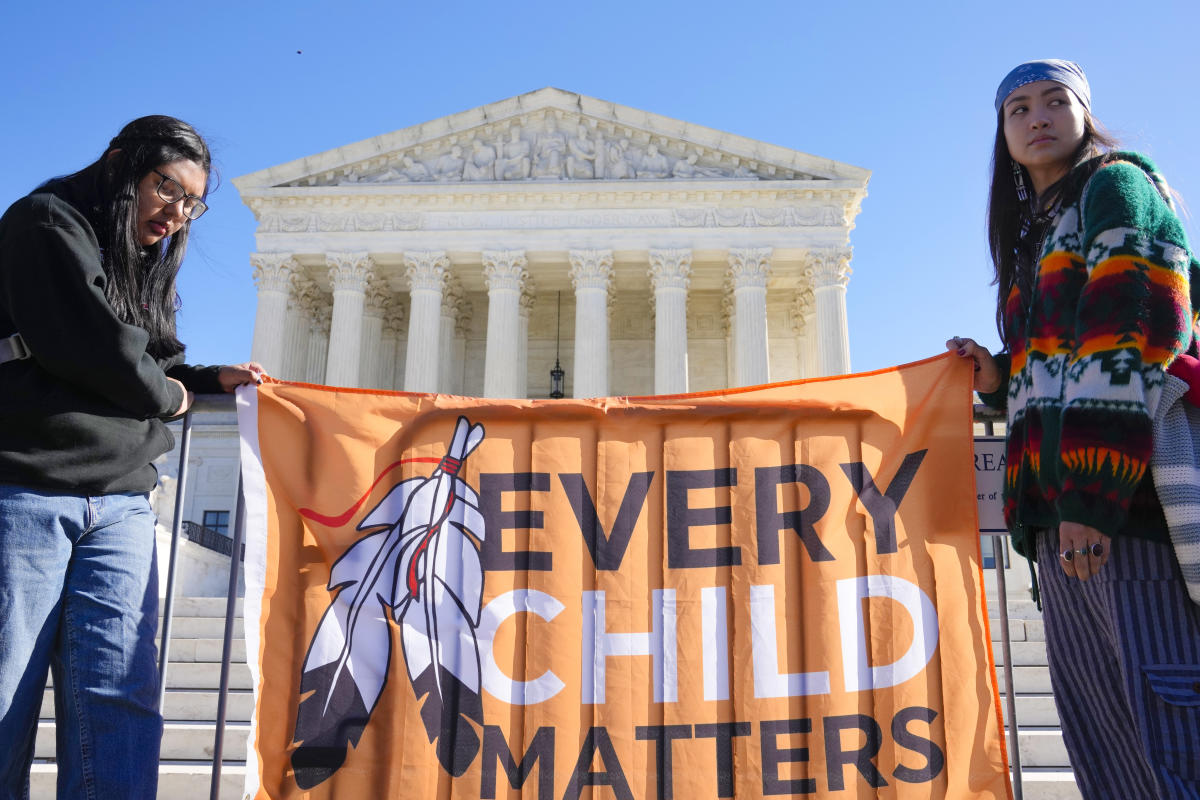States Push for Increased Protection of Indigenous Children’s Rights
HELENE, Mont. (AP) — Leo Thompson received much love, nourishment and protection from the non-Native American family who raised her, but missed any exposure to her Indigenous culture, heritage, ancestors and community.
“The only time they acknowledged my heritage was when they made passive comments like, ‘Oh, you know, you always liked that Native American stuff,’” said Thompson, who lives in Missoula, Montana. “The stuff you mention so casually is not casual at all. They are the practices of my ancestors. It’s the same culture that healed my soul. Reconnecting with my heritage as an adult has been a long and arduous journey.”
Montana is one of a few US states — along with Wyoming, Utah and North Dakota — to consider legislation this year to prevent more Native American children from having similar experiences by amending provisions of the US Indian Child Welfare Act in state laws are incorporated.
States are concerned that the Supreme Court challenges have put federal law in jeopardy. During a hearing last year, judges appeared to allow most of the law that gives preference to Native American families in foster care and adoption proceedings involving Native American children. The law also requires child welfare services to provide services to help local families move towards reunification.
Ten other states have similar laws, including New Mexico, which went into effect this year, and they too could be affected depending on how judges rule. Most state-recognized tribes want the law passed because they fear an adverse decision could overturn a slew of federal laws based on their political ties to the US government.
Thompson, who uses she/they pronouns, shared her story during a recent hearing on a bill sponsored by Montana Democratic Representative Jonathan Windy Boy.
India’s Federal Child Welfare Act was passed by Congress in 1978 in response to the alarming rate at which Native American and Alaskan children were being taken from their homes by public and private agencies. From 1887 to 1969, local children were placed in boarding schools that engaged in abusive practices to assimilate them into white society. Many have been adopted by non-native families, often stripping them of their tribal and cultural heritage.
The law has helped change that, but there is still work to be done.
In Montana, nearly 11% of all children are Indigenous, but they made up 37% of children in foster care as of 2021, according to the National Indian Child Welfare Association. About 9% of children in North Dakota are Indigenous, but make up 44% of children in foster care, according to the association.
“I’ve seen the benefits and experienced what it’s like to have a child in the care of their family, where they stay connected and rooted and know who they are and where they came from,” Sharen shared with Kickingwoman of the ACLU in Montana . testifies. “We know from our experiences and research that affirming Indigenous identity, especially for youth, is one of the most powerful things you can do to build resilience in the face of negative childhood experiences.”
Wyoming’s effort is furthest along after passing the Senate 20-11. In Utah, tribes and statewide officials support the proposal, but lawmakers held it in a legislative committee the last week of January, amid questions as to whether it was still needed and despite a request from Navajo Nation leaders to pass it.
Bills in Montana and North Dakota have had committee hearings but no votes, while a bill in South Dakota was defeated this week.
One aspect of the case, awaiting a Supreme Court decision, argued that India’s Child Welfare Act amounts to transcending federal law and that such protections should be incorporated into state law. Another argument is that the law provides race-based protections that violate the constitutional guarantee of equal protection. Native Americans argue that the measure is an intergovernmental agreement between the US and sovereign tribal nations that, like the US, determine citizenship in a way that is not based on race.
No one testified against the proposed policy during a hearing in Montana, while proponents testified about the importance of family ties within tribes.
Kickingwoman, a member of the Gros Ventre and Blackfeet nations, said Aboriginal societies are built on kinship. Kickingwoman said she was honored to protect many of her relatives, including her cousin’s son, who she said would be considered a distant relative by mainstream society’s standards, “but to her is a son.
“Many of our extended families and friends are close relatives,” she said. “What might be considered a second or third cousin on paper is actually a brother or sister, maybe a niece or nephew.”
Keegan Modrano, a policy director at the Montana ACLU who is Muscogee Creek, was also raised in a non-Native family and was therefore deprived of an opportunity to grow up with their cultural practices, language, or people.
“I can never fully express the incompleteness I feel about my life,” Modrano told the committee.
“My younger self wants nothing more than to have a native father figure in my life. My younger self desires nothing more than a Native American mother, for cousins and relatives, aunts and uncles,” they told the Foster Care System.”
Don’t miss interesting posts on Famousbio
